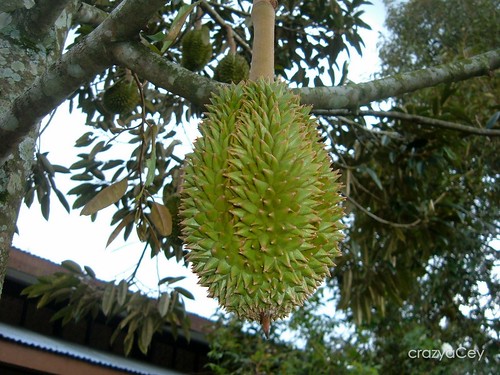 I know a guy here in Winnipeg who likes to tweet about food (among other things). I’ve been trying to get him to join the Manitoba Food Bloggers, but he says he’s not that social. He does send out the most mouth-watering tweets … maybe one day we’ll get him to post recipes and stuff.
I know a guy here in Winnipeg who likes to tweet about food (among other things). I’ve been trying to get him to join the Manitoba Food Bloggers, but he says he’s not that social. He does send out the most mouth-watering tweets … maybe one day we’ll get him to post recipes and stuff.
Anyway, he posted the other day about durian. I confess that I reacted with the utmost disgust. My friend immediately called me out by asking me if I’d ever tried it.
OK, I admit it. I’ve never tasted durian. More to the point, I’ve never smelled it. Apparently that is the salient point about durian – the authentic odour. You either love it or hate it, so I’m told.
The point is that I appear to have an opinion on durian, completely second-hand, based entirely on hearsay. I don’t actually know whether I think durian smells disgusting, because I’ve never smelt it. My friend says it is quite good when ripe, and doesn’t necessarily smell bad. He’s speaking from experience. I have promised to give it a try one of these days and report back.
Of course this little, trivial conversation had me thinking about hearsay and the conclusions we all draw without adequate information. Some might call it malicious gossip, when we feel negatively about something, or more importantly somebody, based on other people’s experiences. Now, I’m not concerned that I hurt the durian’s feelings, and I’m sure Kim Kardashian doesn’t give two hoots what I think about her, even though I don’t know anything about her first-hand (and am quite happy to keep the relationship at this distance).
But now I’m thinking about real people in my life, or even real people in my city or in my online communities, upon whose lives I might actually impinge one way or another. It suddenly becomes much more imperative that I not form opinions without adequate information. If somebody tells me something bad about someone we both know, surely it is incumbent upon me, if I intend to do anything with this information, to gather evidence on the matter rather than spread gossip. It seems obvious, but I can’t help wondering how many of us actually take the trouble to verify those delicious little tidbits of gossip. Defamation can happen very quickly. It doesn’t matter if it’s a fruit, but it definitely matters to a person.
In Judaism, even if the gossip is true we are prohibited from spreading it unless there’s an extremely good reason for doing so. This concept is called Lashon HaRa, the evil tongue. It differs from defamation in that the gossip is true – but so what? Unless somebody’s life or well-being depend on this knowledge being spread, we are supposed to just shut up.
As we begin to approach the High Holy Days, with their call for soul searching and self-improvement, Lashon HaRa is often at the top of people’s lists. I would love to have an ongoing conversation about this. When should discreditable knowledge be spread, and when not?
Oh, and I still have to go pick up some durian from the Asian market. Stay tuned.

It can be a challenge to just shut up and not repeat such things. For the most part, I don’t – largely because I’m not usually all that interested. Sometimes, we make exceptions when it hits really close to home, or affects us or loved ones – but even then, it’s not always necessary.
I think it’s a natural impulse, isn’t it? We’re sociable creatures who like to know what the rest of the herd thinks. Helps us process and form our own thoughts and feelings. Maybe it’s not always bad, but maybe we should all be more careful that it never be hurtful.